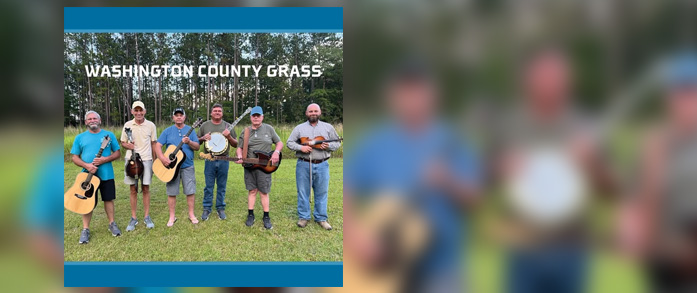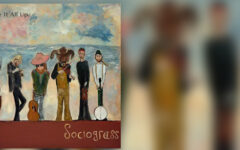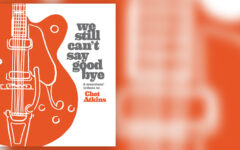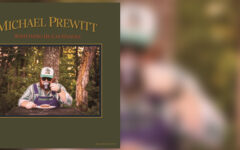
The words “recorded live” carry different meanings within the music world. Often times it’s associated with a project recorded at a live concert. Other times, it’s the term for a field recording made within someone’s home or outdoor property. In the case of Washington County Grass self-titled debut on Common Loon Records, the “live recording” was made in one of the band member’s homes. Unfortunately, this approach does not serve the band or the project well at all.
Washington County Grass is based out of Washington County, Alabama, and consists of Wesley Knapp on guitar, Mike Bailey on banjo, Kelsey Cunningham on fiddle, Anky Akridge on guitar, and Tim Savage on mandolin. Two different electric bassists, Hal Keith and Ronnie Clarke are on this recording; although it’s not noted who’s playing on which track. This is also the case with the vocals. While we do know that Knapp, Ankridge, and Cunningham provide the singing, it’s unclear who is doing what.
From the first few minutes of the opening track, Crying Holy Unto the Lord, it’s clear that this project was made in an overtly loose fashion. As with other tracks on the album, this song is riddled with off key singing, out of tune instruments, and socializing in the background. While spontaneity can bring a certain level of charm to a recording, it’s not always the best approach. In this instance it comes across as amateurish.
Most of the seventeen tracks on this release are standard fare that should be familiar to the majority of avid bluegrass fans. It’s clear that the majority of the songs were done in one take, which in this case isn’t a good thing. This is certainly true with tracks such as Lonesome Road Blues and Where Corn Don’t Grow, where the lack of proper arrangements stand out.
Another big problem with this project is the recording quality. In a lot of cases the vocals are not audible, often times being overridden by the instruments or other background noise. This is most noticeable on Modern Day Bonnie & Clyde written by Walt Aldridge and James LeBlanc. It’s clearly meant to be a story song, but the lyrics aren’t decipherable.
Even with its ragged quality, this album does have its moments. Most of the few highlights revolve around the group’s banjoist, Mike Bailey. Train 45 and Home Sweet Home are both standards that display Bailey’s straight forward traditional style. Out of the seven musicians featured on this recording, Mike is clearly the most skilled of them all. Milk Cow Blues is a fun track that demonstrates Washington County Grass’ enjoyment of the music they’re making together.
One of the most amusing tracks on this entire project is the Ralph Stanley classic, That Lonesome Old Song. Not only do we hear multiple instruments retuning and people coughing throughout this performance, but we also catch a chance meeting between some folks in attendance at what we can only assume is a jam session. It’s heard more clearly than any of the instruments or vocals on this track!
Washington County Grass’ self-titled debut is not a quality release. It doesn’t cast the band in a good light at all. A professionally done recording would’ve better suited the group. The big question is why did Common Loon Records choose to put out a project of such inferiority, especially one that’s serving as the first official release for an artist? Considering the other wonderful recordings released by the newly formed label, this project is a stark, baffling contrast.







